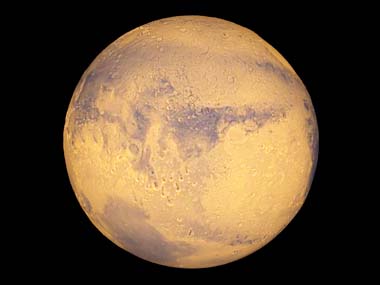LONDON : Mars had a warm and wet climate about four billion years ago and provided a more favourable environment for life, say scientists who have discovered fossilised riverbeds on an ancient region of the red planet.
The study identified over 17,000 km of former river channels on a northern plain called Arabia Terra, providing further evidence of water once flowing on Mars.
“Climate models of early Mars predict rain in Arabia Terra and until now there was little geological evidence on the surface to support this theory,” said Joel Davis from University College London.
“This led some to believe that Mars was never warm and wet but was a largely frozen planet, covered in ice-sheets and glaciers,” said Davis.
“We’ve now found evidence of extensive river systems in the area which supports the idea that Mars was warm and wet, providing a more favourable environment for life than a cold, dry planet,” he said.
Since the 1970s, scientists have identified valleys and channels on Mars which they think were carved out and eroded by rain and surface runoff, just like on Earth.
Similar structures had not been seen on Arabia Terra until the team analysed high resolution imagery from NASA’s Mars Reconnaissance Orbiter (MRO) spacecraft.
The new study examined images covering an area roughly the size of Brazil at a much higher resolution than was previously possible – 6 metres per pixel compared to 100 metres per pixel.
While a few valleys were identified, the team found the existence of many systems of fossilised riverbeds which are visible as inverted channels spread across the Arabia Terra plain.
“Arabia Terra was essentially one massive flood plain bordering the highlands and lowlands of Mars,” he said.
“We think the rivers were active 3.9-3.7 billion years ago, but gradually dried up before being rapidly buried and protected for billions of years, potentially preserving any ancient biological material that might have been present,” he added.
“These ancient Martian flood plains would be great places to explore to search for evidence of past life,” said Matthew Balme, from The Open University in UK.
The research appears in the journal Geology. (AGENCIES)
Trending Now
E-Paper


